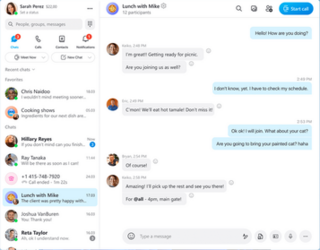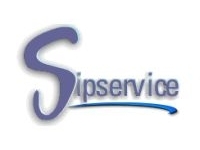Voice over Internet Protocol (VoIP), also called IP telephony, is a method and group of technologies for voice calls for the delivery of voice communication sessions over Internet Protocol (IP) networks, such as the Internet.

Skype is a proprietary telecommunications application operated by Skype Technologies, a division of Microsoft, best known for VoIP-based videotelephony, videoconferencing and voice calls. It also has instant messaging, file transfer, debit-based calls to landline and mobile telephones, and other features. Skype is available on various desktop, mobile, and video game console platforms.
Local number portability (LNP) for fixed lines, and full mobile number portability (FMNP) for mobile phone lines, refers to the ability of a "customer of record" of an existing fixed-line or mobile telephone number assigned by a local exchange carrier (LEC) to reassign the number to another carrier, move it to another location, or change the type of service. In most cases, there are limitations to transferability with regards to geography, service area coverage, and technology. Location Portability and Service Portability are not consistently defined or deployed in the telecommunication industry.
QuteCom was a free-software SIP-compliant VoIP client developed by the QuteCom community under the GPL-2.0-or-later license. It allows users to speak to other users of SIP-compliant VoIP software at no cost. It also allows users to call landlines and cell phones, send SMS and make video calls. None of these functions are tied to a particular provider, allowing users to choose among any SIP provider.
Sipgate, stylised as sipgate, is a European VoIP and mobile telephony operator.
This is a comparison of voice over IP (VoIP) software used to conduct telephone-like voice conversations across Internet Protocol (IP) based networks. For residential markets, voice over IP phone service is often cheaper than traditional public switched telephone network (PSTN) service and can remove geographic restrictions to telephone numbers, e.g., have a PSTN phone number in a New York area code ring in Tokyo.

Windows Live Call was part of Microsoft's Windows Live services. It integrated into Windows Live Messenger to allow users to make PC-to-PC and PC-to-Phone voice and video calls. Microsoft partnered with telecommunication companies around the world to allow users to use a PC equipped with a microphone and speakers and a high speed Internet connection to call almost any regular telephone anywhere in the world.
Yahoo Voice was a Voice over Internet Protocol (VoIP), PC-PC, PC-Phone and Phone-to-PC telecommunications service. It was provided by Yahoo via its Yahoo Messenger instant messaging application.

Deltathree Inc. is an American company engaged in the business of voice over IP telephony services. The company was one of the first in the world to offer a telephony service over the internet, reducing the cost of international calls by over 90 percent.
Ooma, Inc. is an American publicly traded telecommunications company based in the Silicon Valley, California area. Ooma offers communications services including Voice over IP (VoIP) calling for business, home and mobile users.
Tuenti Technologies, S.L.U is a mobile virtual network operator (MVNO) that operates with the Tuenti brand owned by Telefónica. It is a Spain-based tech company that focuses on providing a cloud-based services through its own application and its website to their customers.

Jaxtr was a social communications company that melds together global calling, SMS, and social networking. Founded by Phillip Mobin and Touraj Parang in October 2005, jaxtr uses Voice over Internet Protocol to offer competitive rates as well as free international and long distance calling. Some key differentiators for jaxtr in its market include allowing phone-to-phone calls to and from any mobile and landline phones, offering social networking focused on voice, requiring no software downloads or access pins, and giving users local Direct Inward Dialing (DID) phone numbers. Offered in 56 countries, these numbers allow users in those countries to dial a local phone number which would ring a long distance or international destination phone. Jaxtr also offers users a set number of global SMS messages each month.

Ribbit was a telecommunications company based in Mountain View, California. It was acquired by BT Group on July 29, 2008 for $105 million.
Founded in 2008, Voxofon develops mobile apps and communication services that utilize over-the-top (OTT) voice and messaging technologies for smartphones, tablets, and web applications. Voxofon enables free app-to-app domestic and international calls and texts, as well as provides the option for users to make international calls and texts to friends and family that use feature phones or landlines. The Voxofon app is a cross-platform application that is supported on iPhone, iPod Touch, iPad, Android, Blackberry, Windows Phone, and through any web browser.
A softphone is a software program for making telephone calls over the Internet using a general purpose computer rather than dedicated hardware. The softphone can be installed on a piece of equipment such as a desktop, mobile device, or other computer and allows the user to place and receive calls without requiring an actual telephone set. Often, a softphone is designed to behave like a traditional telephone, sometimes appearing as an image of a handset, with a display panel and buttons with which the user can interact. A softphone is usually used with a headset connected to the sound card of the PC or with a USB phone.
IntelePeer is a privately held company based in Dania Beach, Florida and is a Communications Automation Platform (CAP) provider of voice, messaging, automation, applications, APIs, and analytics for enterprises.
iConnectHere is the consumer division of Deltathree, which provides VoIP internet telephony service to consumers and businesses worldwide. The company's products are: Broadband (Internet) Phones, PC to Phone service, Mobile Dialers, Calling Cards and local phone numbers.

SIPSERVICE was a Voice over IP (VoIP) service provider based in Switzerland that also operated in Germany and Russia.
forfone is a free VoIP-application which enables the user to make calls, send and share text messages, photos & the user’s current location. The App does not require any additional registration or user account but allows direct access to all mobile and landline networks worldwide through Wi-Fi, LTE, 3G or UMTS.
STIR/SHAKEN, or SHAKEN/STIR, is a suite of protocols and procedures intended to combat caller ID spoofing on public telephone networks. Caller ID spoofing is used by robocallers to mask their identity or to make it appear the call is from a legitimate source, often a nearby phone number with the same area code and exchange, or from well-known agencies like the Internal Revenue Service or Ontario Provincial Police. This sort of spoofing is common for calls originating from voice-over-IP (VoIP) systems, which can be located anywhere in the world.







